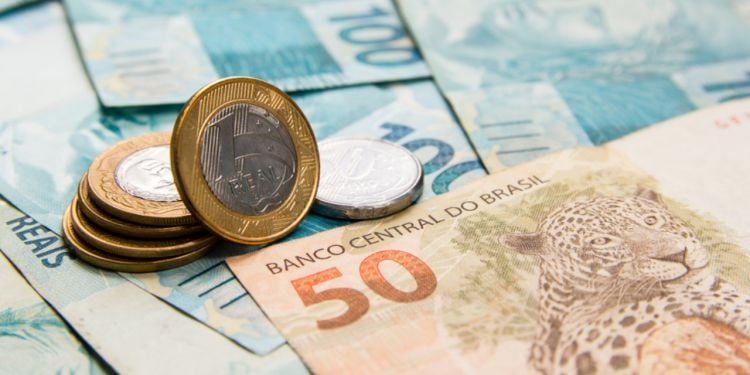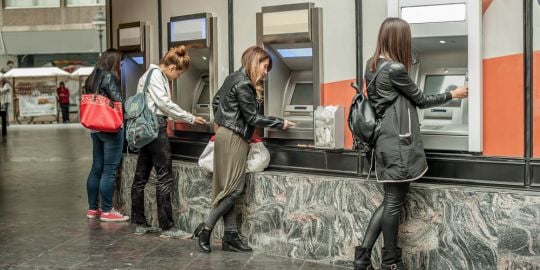Opening a bank account in Brazil

Bureaucracy is deeply rooted in Brazil, and this is never more evident than when dealing with banks. Be aware that until you have an official residency card, such as an RNE (Registro Nacional de Estrangeiros), you won't be able to open a bank account in Brazil (not even a simple savings account). Once you have proof of legal residency in Brazil, visit the bank where you'd like to open an account to determine what documentation you need to provide. The exact documentation can vary a bit depending on the bank and type of account you'd like to open.
The currency in Brazil
The currency used in Brazil is the real, which is written as R$ or BRL. 1 real is equal to 100 centavos.
There are both notes and coins. The denominations for notes are 2, 5, 10, 20, 50, and 100. For coins, the denominations are 5, 10, 25, and 50 centavos, as well as 1 real.
Formalities of opening a bank account
Dealing with banks in Brazil can be frustrating, to put it mildly. If you aren't proficient in Portuguese, then you're encouraged to take a Brazilian friend with you when you visit a bank to open an account, as you may not find anyone on staff who speaks English, and you'll want to be certain that you understand what you need to do.
While there's no law requiring you to have residency in Brazil to open an account, no bank will open an account for you until you show your national identity card. This is true even at branches of international banks such as HSBC and Citibank. Until you have a national identity card (typically an RNE), you'll be wasting your time trying to open any sort of bank account, even if it's a simple savings account. Even if you're able to open a bank account, it'll be associated with very high costs, so we'd recommend sorting out residency to open an account.
Once you have a national identity card, you can move ahead. There are several major banks in Brazil, including Banco do Brasil (government-owned), Bradesco, Itaú, Santander, and Caixa Econômica Federal (also government-owned). All of these banks are regulated by the Central Bank of Brazil (Banco central do Brasil). The international banks HSBC and Citibank have a large presence in Brazil, although HSBC has stated its intentions to close its operations in the country.
Each bank will have its own requirements for opening an account, and the documentation you must produce may vary depending on the specific type of account you wish to open (savings, checking, credit card, etc.). But be prepared to produce the following:
- Registro Nacional de Estrangeiros
- CPF (Cadastro de Pessoas Físicas): This is much like a Social Security card in the US, which you can apply for at most branches of the Correio (Post Office).
- Proof of residence in Brazil: This could be a rental contract or a monthly utility bill (for electricity, internet service, etc.). Failing one of these, a letter from a landlord may suffice.
- Payslip or other proof of income or assets.
You should be able to open a checking account if you can supply this documentation, and will be issued a debit card. Most bank accounts will charge a percentage for every transaction, so keep this in mind when banking in Brazil.
Note, however, that obtaining a credit card will be subject to meeting additional conditions, such as minimum income. Be careful in any case about obtaining a credit card in Brazil, as there are high annual fees, and the high interest rates charged here would be illegal in many countries.
With most banks, you'll be able to do online banking. However, do note that these services are usually available only in Portuguese. Also, generally, Brazilian banks only provide accounts for Brazilian reals. It's not possible to get bank accounts for foreign currencies, although rarely, some exceptions are made for expats who are only in the country temporarily.
Important:
If at some point you wish to close out your Brazilian bank account or credit card, be sure that you obtain written confirmation that the account was in fact closed, to avoid being charged fees in the future.
Savings accounts
If you'd like to get a savings account, the good news is, interest rates are high. Expect around 6%, plus it's tax-free. There's a tax exemption on interest earned because the Brazilian government wants to protect its people against inflation.
Managing without a Brazilian bank account
What do you do if you aren't able to open a bank account in Brazil? Don't despair, as you should still be able to function day to day. In fact, many parts of Brazil have cash-based economies, so this will work in your favor.
You should be able to extract cash using your debit card from back home. It may not work at every bank (check the back of your card for the networks it accesses), and you may be charged fees to withdraw funds, but you'll be able to have cash.
Good to know:
Many ATMs in Brazil are closed from 10 pm to 6 am, so plan your visits accordingly.
Credit cards are also much more widely accepted in Brazil than they were a few years ago. But smaller establishments may accept only debit cards due to high bank fees, or operate on a cash-only basis. So ask if there's any doubt.
Accepting funds when you don't have a bank account is a bit more problematic. Cash, of course, is no problem. You can also accept and cash checks. To do so, go to the bank on which the check is drawn. To avoid potential issues, if possible, go to the particular branch indicated on the face of the check; other branches may simply redirect you there. Be sure to take your passport for identification.
Important:
If a Brazilian writes you a check, be sure that they spell your name correctly to avoid delays. Also, be sure that they don't draw two parallel lines in the upper left of the check, as these indicate that the check cannot be cashed, but only deposited. These lines are commonly added in Brazil as a security measure, in case of theft. But if you don't have an account to deposit the check into, you'll have to return to the person who issued you the check and have them write another one without the lines.
For large amounts of cash (to purchase or sell a property for example), funds transfers into and out of Brazil are also possible. Expect to pay not only bank fees but also a fee to the federal government for any outgoing transfers.
Useful links:









